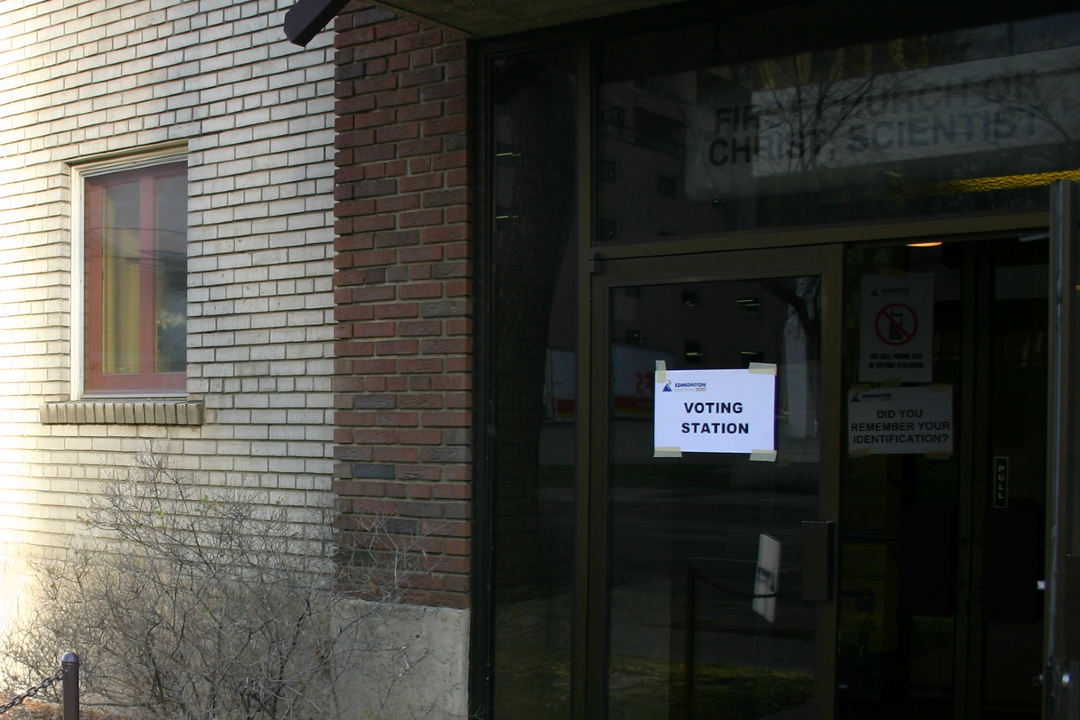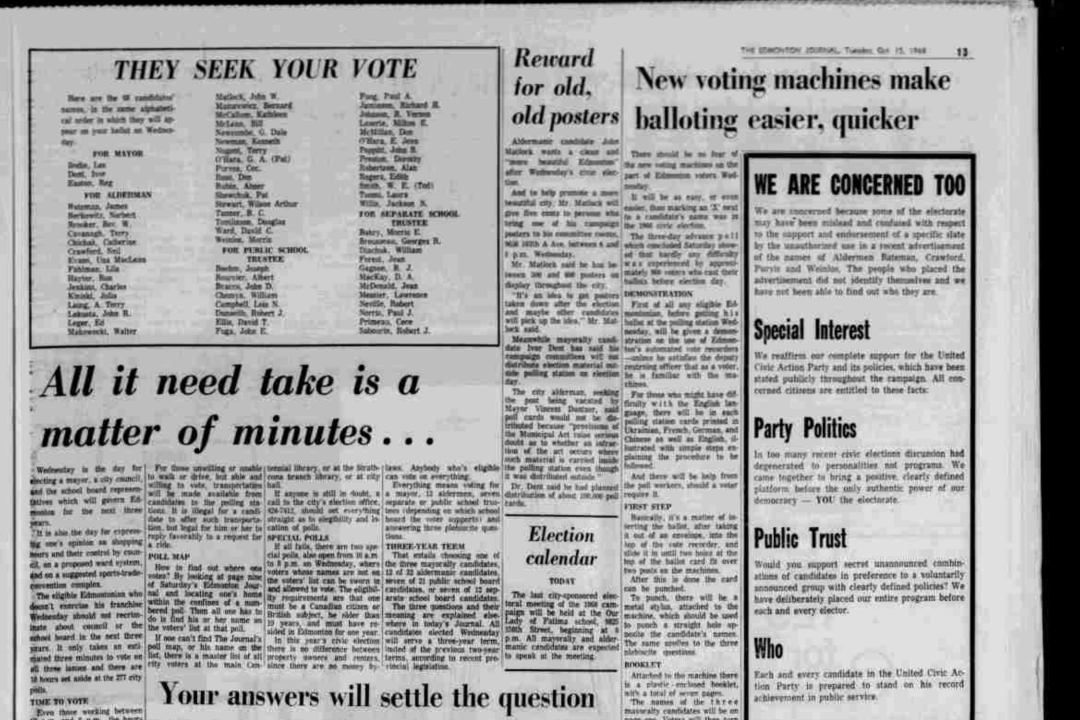While the unofficial results for Edmonton's 2021 municipal election were ready by 8:30pm on voting day, voters should not expect similar in 2025.
"We had all the results before people went to bed on election night, and that will not be the case this time," Aileen Giesbrecht, the returning officer and city clerk for the City of Edmonton, told Taproot.
The reason is changes to election rules that the United Conservative Party government created with Bill 20 in 2024. Giesbrecht said specifically the law's ban on vote tabulation machines means the count will take at least an extra day, and that manual counts for municipal votes will take longer than the recent federal election, which itself spilled over into an extra day, because of the added complexity of municipal ballots. Bill 20, or the Municipal Affairs Statute Amendment Act, includes multiple changes to the Local Authorities Elections Act and the Municipal Government Act. Alberta Municipalities criticized the bill immediately when it was tabled. Municipal politicians did the same, including Edmonton Mayor Amarjeet Sohi (who will conclude his term but not seek re-election now that he lost a race for a seat in the federal election).
In October, just after the new rules came into effect, the City of Edmonton estimated the changes would mean holding the 2025 election would cost $4.8 million more than holding the 2021 election. In 2021, the municipal election cost just more than $7.3 million, though the City of Edmonton only spent a bit more than $3.2 million due to a provincial grant and cost sharing with Edmonton's school boards.
Giesbrecht said the $4.8 million estimate is likely in the right ballpark but that the actual amount could still change.
"Sometimes legislation changes right up until the last minute," she said. "Right now, the information (we're working with) is what was passed in the legislature for Bill 20, and then any other changes that might be coming."
In April, the UCP government introduced further changes to municipal elections with Bill 50, which is also called the Municipal Affairs Amendment Act. That bill tweaks recount procedures, and adds requirements to offer private voting areas for voters with disabilities. The bill makes many further changes outside of election processes.
Giesbrecht said the city worked on analyzing the 2021 election process to improve it, only to now need to start over. The biggest cost that the new rules create boils down to extra staff hours, which are needed given that manual counting takes longer and requires more workers. She added that the city will have to hand count four types of ballots — for mayor, councillor, public school trustee, and Catholic school trustee — and pay for those ballots, too.
"We purchase a ballot for every single elector in Edmonton, whether they show up or not, because, obviously, it's your right to vote," Giesbrecht said.
In October, Municipal Affairs Minister Ric McIver told reporters that mandating manual counts by banning tabulators will improve voter trust in the election process. Giesbrecht, meanwhile, said there have been "no issues with tabulators," and that the city doesn't know for sure when the last time it hand-counted ballots. Her office later provided Taproot with a scan of an Edmonton Journal article from 1968 that announced the adoption of tabulators.

A municipal voting station in 2010. Results from this year's election will arrive at least one day later than in the last election in 2021 because the provincial government now requires the city to count votes by hand. (Mack Male/Flickr)
Giesbrecht said the city has been transparent in its use of vote tabulator machines. In 2021, there were "a few" ballot boxes that needed to be counted after the counting centre closed. The affected candidates were permitted to see each step in the counting process, including a double verification that validated the accuracy of the results, she said.
Her team is working to create further transparency by creating a campaign to explain how the election works, which includes videos that will roll out soon. "(Especially) if you're new (to Edmonton), this is the first time you get to vote in Canada, or you've just turned 18, we don't want people to be intimidated. We want people to have confidence," she said.
Giesbrecht and her team are also practicing for election day and consulting with jurisdictions to determine the best way to hand count the votes. An exact counting method is still to be determined, she added.
When Bill 20 passed, Premier Danielle Smith said the province would examine how it could "defray the cost" that requiring manual counts would create.
Taproot reached out to Smith's office for details on actions the province is taking to defray those costs, but instead received a written statement attributed to McIver. "We'll continue working with Alberta's municipalities and we're confident that they will be able to run their elections smoothly and efficiently this fall," McIver said in the statement, though the statement did not offer specific details.
Giesbrecht can't say exactly when unofficial results will be ready for the upcoming October election, but official results must be announced by Oct. 24 at noon, per provincial legislation. "The legislation did not change the timeline" for the province's requirements, she said.
On April 29, one day after the federal election, the province introduced Bill 54, which if passed will mean provincial elections will be manually counted. That bill also sets a deadline of 12 hours for the unofficial vote count to be released in provincial elections.

The City of Edmonton team responsible for switching from vote tabulators to a manual count this year said they don't know the last time a municipal vote was counted by hand in Edmonton. Their best guess is through this newspaper clipping, from 1968, when the Edmonton Journal reported on the adoption of counting machines in the city. (Supplied)
Bill 20 improvements?
Bill 20 includes changes to the election that have not received as much attention as vote counting or the addition of political parties. Some of them are useful, Giesbrecht said.
"One of the things that I think is really helpful is the change to (special or mail-in) ballots," she said. In the past, special ballots were for voters outside Canada, but now any Edmontonian can get one. That helps people who have a difficult time leaving home on election day, Giesbrecht said.
(Elections Canada spent much of the Tuesday after voting day counting special ballots.)
Giesbrecht said Bill 20's requirement that municipalities keep a permanent voter register, which is estimated to cost Edmonton $1 million this year, will improve transparency in election processes.
Later clarifications in the subsequent Bill 50 are "really clear that that list of voters is not going to be given to candidates or scrutineers or their agents," she added.
The province is also providing data from Elections Alberta to help the city verify eligible voters. Giesbrecht said she would "love it" if voters registered with Elections Alberta by Aug. 15.
